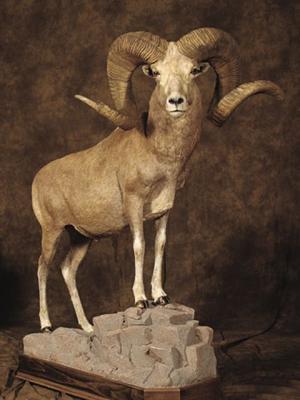2011 - Volume #35, Issue #2, Page #42
[ Sample Stories From This Issue | List of All Stories In This Issue | Print this story
| Read this issue]
Can World's Biggest Sheep Improve Shrinking Farm Flocks
 |
Kohls, a retired county extension agent, raises sheep and goats on his Texas ranch. He's a goat expert and was one of the U.S.'s earliest importers of Boer goats from South America.
His focus now is the Altai Argali sheep in Eastern Asia, which is considered to be an endangered species due to habitat loss from domestic animal grazing. A Mongolian hunt for the sheep can cost upwards of $70,000. It's a sought after trophy because it's the largest sheep breed with horns that weigh up to 75 lbs.
Kohls recognizes the potential of the hunting market in the U.S. if Argali were raised in high fence enclosures. The U.S. only issues two permits a year to bring the head and horns back from a Mongolian hunt, because the breed is on the endangered species list. But his idea is to use the breed to improve domestic sheep herds. He explains that many growers have shifted to markets for wool-less, small sheep to meet the needs of Muslim consumers. That shift has reduced the numbers in larger sheep breeds, and he fears that there won't be enough supply in the future.
"When you lose any part of the industry, it hurts everyone," Kohls says. "Ifáwe could get some (Argalis) here, they could be used for the feeder market. They want heavier lambs."
Kohls notes that breeding wild sheep has been difficult in the past because of their susceptibility to diseases. He believes Argalis would be different. They live in extreme heat and cold and seem to thrive on poor grazing grounds like those found in West Texas.
"They don't have wool on them, and they have lived there for centuries and survived domestic livestock diseases," Kohls says.
Kohls likes the Altai breed because it has the largest muscle mass in the Argali sheep family. Though the sheep can weigh up to 400 lbs., Kohls isn't concerned about birthing problems, which he says can be taken care of through selective breeding.
He suggests starting the process by capturing Argali sheep and putting them in a zoo in China or an Eastern European country under quarantine. Then, when they pass import testing, some could be moved to a U.S. zoo, and sheep breeders (and hunting groups) would be able to participate in drawings to acquire semen to begin breeding trials on their own flocks.
Contact: FARM SHOW Followup, Norman Kohls, N&K Ranches, Rt. 1, Box 27C, Eldorado, Texas 76936 (325 853-2226; www.nandkranches.com).

Click here to download page story appeared in.

Click here to read entire issue
To read the rest of this story, download this issue below or click here to register with your account number.




